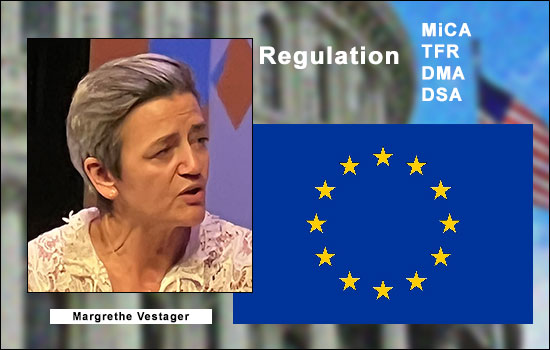European government officials have been busy the past several weeks as efforts to improve the guardrails around the digital commerce and blockchain ecosystems finally came to fruition. Let’s review.
MiCA
Regarding the new Markets in Crypto-Assets (MiCA) regulation framework agreed to on June 30, Stefan Berger, a German centre-right lawmaker who helped lead the European Parliament’s negotiations was widely quoted as saying, “Today we put order in the Wild West of crypto assets and set clear rules for a harmonised market.” He added, “The recent fall in the value of digital currencies shows us how highly risky and speculative they are and that it is fundamental to act.”
CNBC described some of the regulation’s most restrictive elements:
“Under the new rules, stablecoins like tether and Circle’s USDC will be required to maintain ample reserves to meet redemption requests in the event of mass withdrawals. Stablecoins that become too large also face being limited to 200 million euros in transactions per day.”
The 200 milion euro limit appears to put a restriction on growth for cryptocurrency and associated blockchain technology companies which could inhibit innovation in the EU. But according to lawmakers, their first goal is to stamp out money laundering and other illicit activity as well as protect consumers from the dark side of cryptocurrencies.
Transfer of Funds Regulation (TFR)
At the same time, and separately, the European Union also agreed to strict know-your-customer requirements that the global standards body Financial Action Task Force (FATF) had requested.
According to Coindesk, the final implementation of the law known as Transfer of Funds Regulation (TFR) “will mean customer identity needs to be verified for even the smallest crypto transfers, if it’s between two regulated digital wallet providers – but payments to unhosted private wallets will largely be left out of laundering checks.” For the crypto industry and privacy advocates, overcoming a potential travel rule which would have meant KYC requirements for unhosted wallets was seen as a minor victory. Still, there is no limit on the reporting requirement between European member financial institutions which means even the purchase of a cup of coffee with Bitcoin presumably will need to be reported. There had been a $1,000 diminimus exemption proposed but it was left off the final framework.
Overall, MiCA and TFR will likely come into full force in early 2024 with stablecoin rules coming in a year. The most beneficial element for blockchain companies is that crypto regulation will now be “harmonized” across all EU member states.
Digital Markets Act and Digital Services Act
Last week, European Parliament members approved sweeping regulation which looks to require large technology companies to behave fairly or suffer the consequences. Though not identifying blockchain or cryptocurrency as a part of either Act, the technology regulation initiative in the European continent is clear.
First, under the Digital Services Act (DSA), companies such as Google and Facebook, Amazon and Apple will need to keep the competition open to smaller competitive players in spite of big tech’s often superior speed, ubiquitious product and scale. The law also specifies that “illegal” online content must be removed by the large, platform companies. Read more on the European Commission’s website.
The Digital Markets Act (DMA) requires companies to obtain “explicit consent” for targeting ads using personal data. According to Axios, it also “requires interoperability between messaging platforms like Apple’s iMessage and Meta’s WhatsApp. [And] it mandates that large platforms let users select a browser, search engine and personal voice assistant of their choice.”
The bigger picture of the impact of these laws was mentioned by European Commission EVP Margrethe Vestager at South by Southwest in March where she said democracy was at stake:
“I think for me with social media, the most important thing is that platforms will be obliged to do some sort of recourse through social risk assessments. Can my services be abused to undermine democracy? Can my services be abused or are they in themselves a mental health risk? Because I think that these are some of the things that we’re all struggling with. Is this healthy for us or is there a trade-off between profit and health? And if that is the trade off, it’s not always for the benefit of good health?”
Violation of either law will be met with stiff fines according to the statutes.

